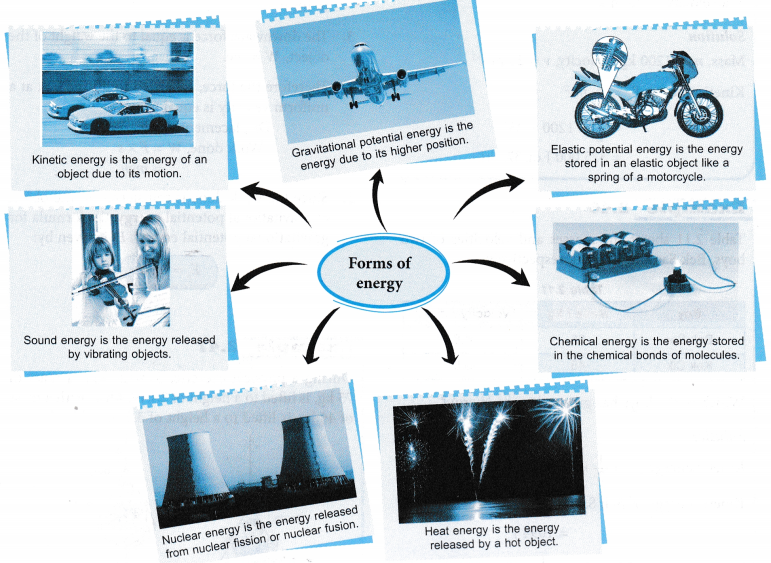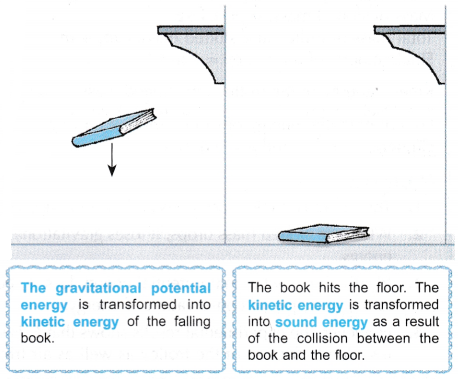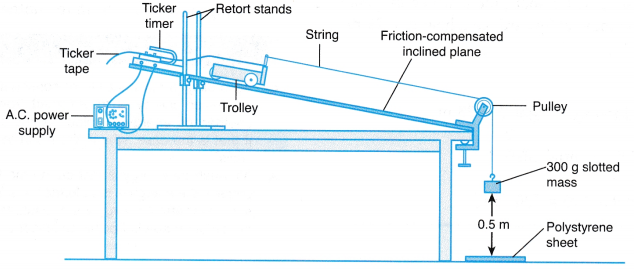What is Energy
Definition: Energy is the ability to do work. The amount of energy possessed by a body is equal to the amount of work it can do when its energy is released. Thus, energy is defined as the capacity of doing work. Energy is a scalar quantity and it exists in various forms.

Units of energy: The units of energy are the same as that of work. In SI system, the unit of energy is joule (J). In CGS system, the unit of energy is erg.
- 1 Joule = 107 ergs
- Other units of energy in common use are watt-hour and kilowatt hour.
- 1 watt-hour = 1 watt × 1 hour
= 1 watt × 60 × 60 sec
= 3600 J - 1 kilowatt-hour (kWh) = 3.6 × 106 Joule
- Heat energy is usually measured in calorie or kilocalorie such that
1 calorie = 4.18 J - A very small unit of energy is electron volt(eV).
1 eV = 1.6 × 10-19 J
The energy possessed by a body due to its state of rest or state of motion is called mechanical energy.
Mechanical energy is of two types
(A) Kinetic Energy (B) Potential Energy.
Principle of Conservation of Energy
- Principle of conservation of energy states that energy cannot be created or destroyed but can be changed from one form to another.
- The total energy of the universe is constant. The total energy of an isolated system is constant.
- Figure shows the transformation of energy from one form to another.


Principle of Conservation of Energy Experiment
Aim: To study the principle of conservation of energy.
Materials: Ticker tape, a polystyrene sheet, string, a 300 g slotted mass, a pulley, cellophane tape
Apparatus: Ticker timer, a.c. power supply, two retort stands with clamps, trolley, electronic balance, plane
Method:
- A friction-compensated plane is arranged as shown in Figure.
- The mass of the trolley, m1 is measured with an electronic balance.
- A slotted mass of mass, m2 = 300 g is tied to one end of a non-elastic string.
- The other end of the string is tied to one end of the trolley.
- The string is placed over the pulley and held at 0.5 m above the polystyrene sheet.
- The ticker timer is switched on and the slotted mass is released so that it falls downward, pulling the trolley down the runway.
- The ticker timer is analysed to determine the final velocity of the trolley.

Results:

Discussion:
- The plane is friction-compensated to minimise energy loss due to friction.
- When the slotted mass drops, it loses gravitational potential energy. The trolley and slotted mass gain kinetic energy.
- Ideally the gravitational potential energy loss, Ep equals to the kinetic energy gain, Ek. This is in accordance to the principle of conservation of energy.
- However, the experimental results shows that Ek is slightly less than Ep. This is because of unavoidable energy loss due to friction of the trolley as well as air friction.